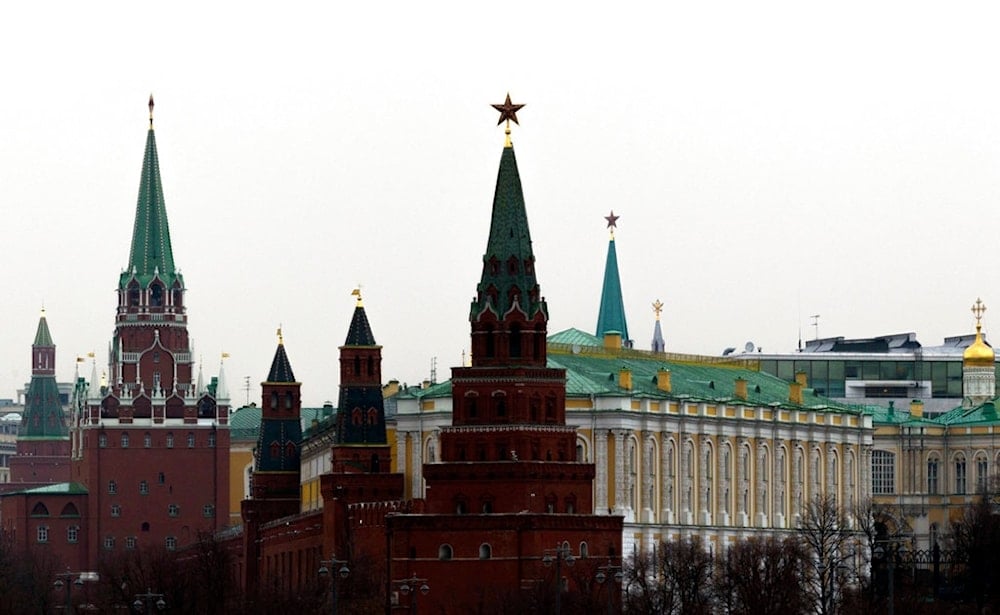Kremlin warns of escalation if US sends Tomahawk missiles to Ukraine
The Kremlin warned that US plans to supply Ukraine with Tomahawk missiles would mark a serious escalation, accused Kiev of rejecting peace talks, and announced that President Putin will address the roots of the global crisis at the upcoming Valdai Conference.
-

The Kremlin Palace and Towers are seen in Moscow, Russia, Friday, April 7, 2017 (AP)
Russian officials warned that any US move to supply Tomahawk cruise missiles to Ukraine would represent a grave escalation of the ongoing conflict. The remarks came Thursday from Kremlin spokesman Dmitry Peskov, who said Moscow would interpret such a decision as a major provocation requiring a strong response.
"If this happens, it will be a new, serious escalation of tensions that will require an adequate response from Russia," Peskov told journalist Pavel Zarubin.
The Kremlin's warning follows recent US discussions about allowing Ukraine to conduct deeper strikes into Russian territory, a policy shift that Moscow says crosses a dangerous line. Peskov dismissed the notion that any advanced weaponry could alter the war's trajectory, insisting that Russia's military objectives would remain unchanged.
"There is no magic weapon for Kiev, and no weapon can radically change the course of events on the front line," he added.
Peskov also cautioned that certain US officials have hinted at approving long-range operations within Russian borders, a step he called "a rather dangerous symptom." He accused Western countries of being unwilling to address even the theoretical prospect of nuclear technology transfers to Ukraine, remarking, "The West is afraid to talk about the possibility of transferring nuclear technology to Kiev."
Diplomacy at a Standstill
The Kremlin spokesman further addressed the faltering peace process, blaming Kiev's reluctance to resume talks for prolonging instability.
"There's a pause in negotiations, an unclear horizon for continuing these negotiations. The Kiev regime's position is quite abstract. They don't want to continue negotiations. They don't want to try to reach an agreement on anything," Peskov said.
He noted that the impasse undermines predictability in the conflict, but reiterated Moscow's willingness to engage in dialogue. "Nevertheless, we [Russia] should calmly do our job, maintain openness to dialogue and communication with all parties," he said.
The comments come amid a wider diplomatic deadlock. Although US President Donald Trump initially pledged to mediate between Moscow and Kiev, efforts to secure a settlement have stalled. The Alaska Summit in August, which brought Trump and President Vladimir Putin face-to-face, ended without any ceasefire or framework for peace. Washington's insistence that Kiev be allowed to negotiate from a position of strength clashed with Russia's demands for recognition of its territorial claims, leaving little room for compromise.
Analysts say Trump's earlier openness to a negotiated settlement has gradually given way to a harder line. Facing domestic and allied pressure, his administration has grown more supportive of Ukraine's deeper-range operations and intelligence access, a shift that Moscow sees as evidence of Washington's backtracking on its stated commitment to peace.
Putin to Outline Russia's Global Vision at Valdai
Looking ahead, Peskov confirmed that President Vladimir Putin will use his upcoming Valdai Conference address to elaborate on Russia's perspective of the international order.
"Obviously, he will talk about the current situation, about the root causes of this situation, about the possible forms of its development," he told Rossiya-1.
The spokesman described the upcoming remarks as "profound and conceptual," saying they will clarify Moscow's view of a world shaped by Western overreach and what it calls an "unrestrained" European posture. "It is obvious that the Europeans have taken such a rather unrestrained position," Peskov noted.
A Deepening Divide
The statements underline a deepening rift between Moscow and Western capitals. Despite Trump's earlier promises to broker peace, no breakthrough has emerged, and both Russia and Ukraine appear entrenched in their positions. The US deliberation over Tomahawk missiles, if confirmed, would mark another escalation in the West's direct support for Kiev, and further complicate any path toward negotiation.
For Moscow, the message is clear: it views the war as part of a broader confrontation with the West, one that cannot be settled without addressing what Putin has repeatedly described as the "root causes" of the crisis, NATO expansion, security guarantees, and Western interventionism.
Read more: NATO became tool of US expansion, says US economist

 4 Min Read
4 Min Read











